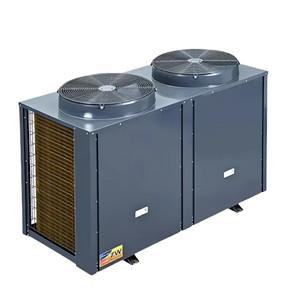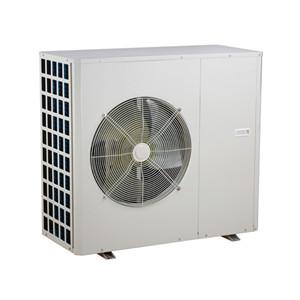Description
Not only can a heat pump be used to heat and cool your home, but it can
also be used to heat water. To work, an air source heat pump water heater takes
heat from the surrounding air and dumps it into a tank at a higher temperature
to heat the water.
Types of heat pump water heaters:
Heat pumps are available in two configurations: integrated/compact
system and split system.
1. Integrated/Compact System: Compressor and storage tank are one unit.
2. Split system: The oil tank and compressor are separate, just like a
split air conditioner.
How does a heat pump water heater work?
Heat pumps work by using refrigerant that evaporates at low
temperatures.
The process has several steps:
1. The liquid refrigerant absorbs heat from the air through the
evaporator and turns into a gas.
2. The gas refrigerant is compressed in the electric compressor.
Compressing the gas causes its temperature to rise, making it hotter than the
water in the tank.
3. The hot gas flows into the condenser, where it transfers heat to the
water, which then becomes liquid again.
4. The liquid refrigerant then flows into the expansion valve where it
is decompressed, allowing it to cool and enter the evaporator to repeat the
cycle.
Heat pumps use electricity to drive compressors and fans, unlike
traditional resistance water heaters that use electricity to heat water
directly. A heat pump is able to transfer more heat energy from the surrounding
air to the water, which makes it very efficient. The amount of heat that can be
transferred from air to water depends on the ambient temperature.
When the outside temperature is higher than the cold refrigerant, the
heat pump absorbs the heat and transfers it to the water. The warmer the
outside air, the easier it is for the heat pump to provide hot water. As the
outside temperature decreases, less heat can be transferred, which is why heat
pumps don't work well in cooler locations.
In order for the evaporator to continuously absorb heat, a constant
supply of fresh air is required. Fans are used to assist air flow and remove
cooled air.
How to choose a heat pump water heater?
Heat pump water heater systems typically have a higher initial cost than
traditional storage water heaters. However, their lower operating costs can
offset higher acquisition and installation prices. You can buy a heat pump hot
water system with a built-in storage tank and backup resistive heating elements.
You can also retrofit heat pumps to work with existing conventional storage
water heaters. You can also install an air source heat pump system that
combines heating, cooling and water heating. These combined systems extract
heat from outdoor air in winter and indoor air in summer. Because they remove
heat from the air, any type of air source heat pump system will work more
efficiently in warmer climates.
Here are a few more things you need to consider before purchasing a heat
pump hot water system:
1. Size and first hour rating.
2. Fuel Type and Availability
3. Energy Efficiency (Energy Factor)
4. Total cost
Installation Precautions
Proper installation and maintenance of your heat pump hot water system
can optimize its energy efficiency.
Proper installation depends on many factors. Such as fuel type, climate,
local building code requirements and safety concerns. Therefore, it is best to
have your heat pump installed by a qualified heating contractor. Heat pump
water heaters need to be installed in a location that stays within 40º–90ºF
(4.4º–32.2ºC) year-round and provides at least 1,000 cubic feet (28.3 cubic
meters) of air space around the water heater. Cold exhaust air can be
distributed to the room or outdoors. They should be installed in overheated spaces,
such as furnace rooms, as they do not operate effectively in cold spaces. They
tend to cool the space they are in.






